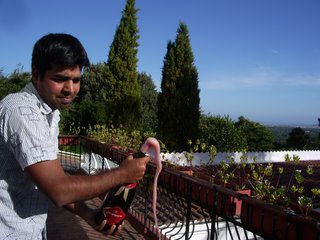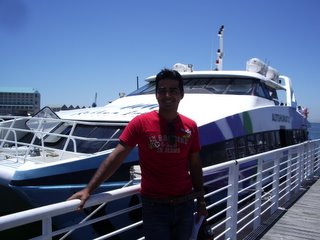Tuesday, December 27, 2005
Wednesday, December 21, 2005
Tuesday, December 13, 2005
Che Guevara
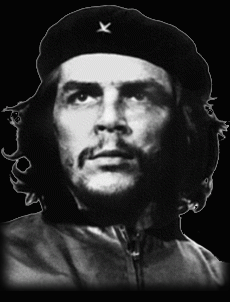 Ernesto Rafael Guevara de la Serna (June 14, 1928 - October 9, 1967), commonly known as Che Guevara, was an Argentine-born Marxist revolutionary and Cuban guerrilla leader. “Che” is an Argentine expression for calling someone's attention, and in some other parts of Latin America, a slang for someone from Argentina.
Ernesto Rafael Guevara de la Serna (June 14, 1928 - October 9, 1967), commonly known as Che Guevara, was an Argentine-born Marxist revolutionary and Cuban guerrilla leader. “Che” is an Argentine expression for calling someone's attention, and in some other parts of Latin America, a slang for someone from Argentina. Guevara was a member of Fidel Castro's 26th of July Movement, which seized power in Cuba in 1959. After the revolution Guevara became second only to Fidel Castro in the new government of Cuba. After a brief stints as president of the National Bank and Minister of Industries, Guevara did not settle in as part of the new Cuban government, and tried without success to stage revolutions through guerilla warfare in various countries, notably the Democratic Republic of the Congo and Bolivia, where he was captured by a unit of the Bolivian Ranger Battalion advised by United States Green Berets on October 8, 1967, and executed the following day.
Quotes
“We must carry the war into every corner the enemy happens to carry it, to his home, to his centers of entertainment: a total war. It is necessary to prevent him from having a moment of peace, a quiet moment outside his barracks or even inside; we must attack him wherever he may be, make him feel like a cornered beast wherever he may move. Then his moral fiber shall begin to decline, but we shall notice how the signs of decadence begin to disappear.”
—Che Guevara, Message to the Tricontinental
“In a revolution, one triumphs or dies.”
—Che Guevara (farewell letter to Fidel Castro; dated April 1, 1965)
“Hatred as an element of the struggle; a relentless hatred of the enemy, impelling us over and beyond the natural limitations that man is heir to and transforming him into an effective, violent, selective and cold killing machine. Our soldiers must be thus; a people without hatred cannot vanquish a brutal enemy.”
—Che Guevara (message to the Tricontinental; 1967)
“At the risk of seeming ridiculous, let me say that the true revolutionary is guided by a great feeling of love.”
—Che Guevara
“Many will call me an adventurer - and that I am, only one of a different sort: one of those who risks his skin to prove his platitudes.”
—Che Guevara
Some delayed Post! Sorry!
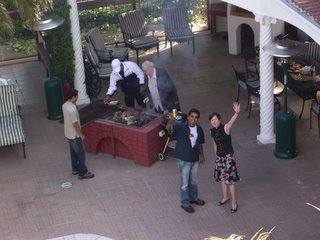 10-Dec -2005: The last Party of LUWASA, this was the last but most exiting party we ever had, more than 35 guests . Party went up to 3 Am, we swam in night, throwing each other in swimming pool. It was a great fun.
10-Dec -2005: The last Party of LUWASA, this was the last but most exiting party we ever had, more than 35 guests . Party went up to 3 Am, we swam in night, throwing each other in swimming pool. It was a great fun.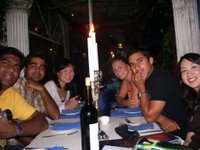
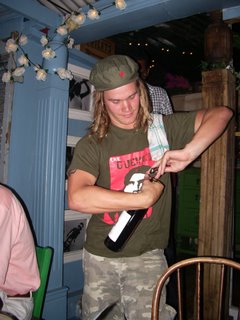
9th-Dec-2005: Gillian's Invitation to “Cape to Cubana”:
Cape of Cubana is a very interesting place, Inspired by Che Guevara: (I will dedicate my next post about Che)
 6th-Dec-2005: Shinji’s Invitation to Japanese Restaurant: "Kubo's little Japan" is a small but very
6th-Dec-2005: Shinji’s Invitation to Japanese Restaurant: "Kubo's little Japan" is a small but veryethnic and wonderful restaurant!!
I specially liked Sake (Rice wine) and fried ice cream, yes!! fried ice cream.
Monday, December 12, 2005
Sunday, December 11, 2005
Monday, December 05, 2005
History
For nearly 400 years, Robben Island, 12 kilometres from Cape Town, was a place of banishment, exile, isolation and imprisonment. It was here that rulers sent those they regarded as political troublemakers, social outcasts and the unwanted of society.
During the apartheid years Robben Island became internationally known for its institutional brutality. The duty of those who ran the Island and its prison was to isolate opponents of apartheid and to crush their morale. Some freedom fighters spent more than a quarter of a century in prison for their beliefs.
Those imprisoned on the Island succeeded on a psychological and political level in turning a prison 'hell-hole' into a symbol of freedom and personal liberation. Robben Island came to symbolise, not only for South Africa and the African continent, but also for the entire world, the triumph of the human spirit over enormous hardship and adversity.







